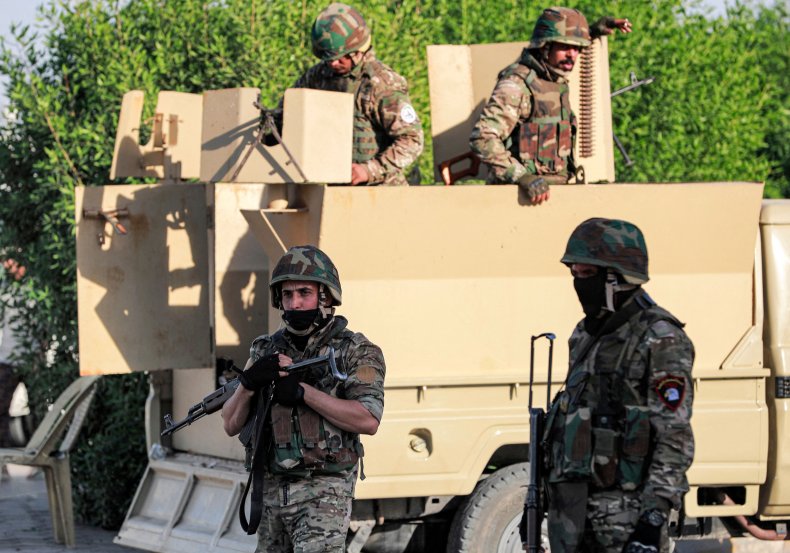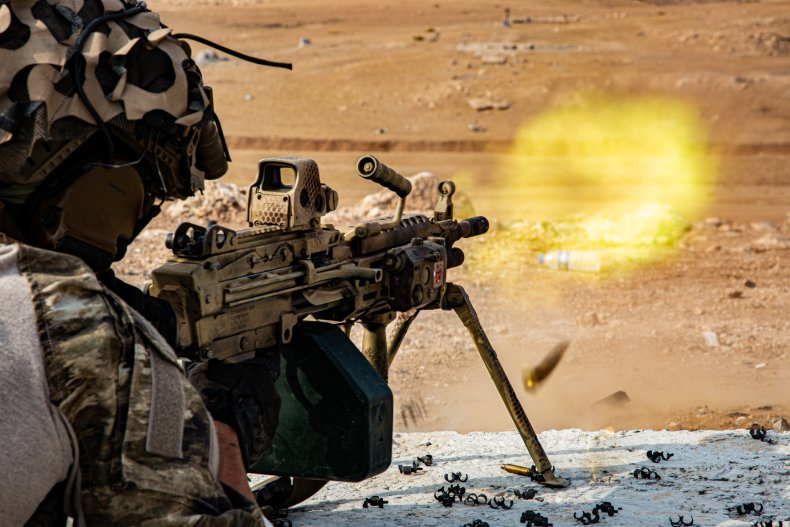
Iraq Resistance Warns It’s Ready to Expel U.S. by Force at End of Year
By Tom O’Connor On 11/19/21 at 6:27 PM EST
A group of Iraqi militias has issued a warning that they were prepared to take up arms against the U.S. military presence in Iraq if U.S. troops stayed in the country past the upcoming year’s end deadline for combat operations revealed over the summer by President Joe Biden.
In a statement issued Friday and shared with Newsweek, the Iraqi Resistance Coordination Commission, an umbrella of paramilitary groups aligned with the pro-Iran Axis of Resistance opposed to the U.S. footprint in the region, said its members were “closely monitoring the extent of commitment to the outcomes of the so-called strategic dialogue round” that took place between Washington and Baghdad in July.
The message went on to say that the council “did not believe in the seriousness of the occupation and its commitment” to withdrawing combat troops from Iraq according to the established timeline, but was itself “committed to giving the Iraqi negotiator an opportunity to expel the American occupation from our pure land through diplomatic means.”
But since then, the commission said it had “not yet seen any manifestations of withdrawal despite that only 42 days separate us from 12/31/2021.”
“On the contrary, we have observed that the brazen American occupation increased its numbers and equipment in its bases in Iraq,” the commission said, “and we even heard official and semi-official statements from officials of the American states of evil about their intention not to withdraw from the country under the pretext that there was a request from Baghdad [not] to do so, at a time when we did not see any response or denial from the Iraqi government about these clumsy statements!”
The militia said its forces were prepared to meet such an outcome with action.
“We affirm that the weapons of the honorable resistance, which have been talked about a lot in the past days, and some insisted on embroiling them in recent political rivalries, will be ready to dismember the occupation as soon as the moment comes and the deadline ends after twelve o’clock in the evening of 12/31/2021,” the statement said.
The ongoing presence of U.S. troops going on four years after Iraq declared victory over the Islamic State militant group (ISIS) has remained a dividing factor in the country, especially as clashes between U.S. troops and Iraqi militias have escalated in recent years. Frictions peaked at the turn of 2019 to 2020 as deadly exchanges culminated in the U.S. slaying of Iraqi Popular Mobilization Forces deputy chief Abu Mahdi al-Muhandis and Iranian Revolutionary Guards Quds Force commander Major General Qassem Soleimani at Baghdad International Airport.
Shortly after this event, Iraqi lawmakers voted for the expulsion of foreign forces from the country, and Soleimani’s successor, Esmail Qaani, has further vowed to push U.S. forces from the region.
Rocket strikes have continued to target U.S. positions and President Joe Biden has twice retaliated, striking sites in both Iraq and neighboring Syria, where Iran-backed groups deployed against ISIS and other jihadis have also targeted U.S. troops tasked with a similar mission.
Domestic politics have also proven an incendiary factor as of late. Last month, the country held its sixth election since the 2003 U.S. invasion that toppled longtime leader Saddam Hussein.
The results saw strong gains for influential cleric Muqtada al-Sadr and a disappointing turnout for paramilitary blocs whose supporters took to the streets to challenge the vote, leading to clashes with security forces in which at least two demonstrators were killed.
Upon the backdrop of these events, Iraqi Prime Minister Mustafa al-Kadhimi’s residence was targeted by small, explosives-rigged drones earlier this month in an apparent assassination attempt that prompted near-universal condemnation, including from the U.S., Iran and the Iraqi Resistance Coordination Commission. No group has claimed responsibility for the attack.
Those seeking a timely withdrawal of U.S. forces have accused Kadhimi of being soft on Washington, while those critical of Tehran have accused Iran of exerting pressure on the Iraqi leader through the use of its local partners.
The U.S., for its part, has offered no sign it planned to pull out of Iraq completely as it did in Afghanistan in August, and the definition of “combat” forces has remained somewhat unclear as the Pentagon has maintained for years that its presence in the country was solely for training and advising Iraq personnel to fight ISIS.
U.S. Deputy Assistant Defense Secretary for the Middle East Dana Stroud reaffirmed the Biden administration’s commitment to the December 31 deadline during an interview aired Tuesday by Al Jazeera, but she also said that U.S. troops would continue to support Iraqi forces as long as Baghdad welcomed them in the country.
“We are still committed to advising and assisting the Iraqi forces in their fight, and we’ll be there so long as they would like our help,” she said.
She also said that “the United States remains absolutely committed to Iraq, the security of Iraq, the sovereignty of Iraq and the ability of Iraqi citizens to live in peace and safety.”

On Sunday however, Iraqi member of parliament and the Al-Sadiqoon bloc that represents the powerful, influential Asaib Ahl al-Haq militia Hassan Salem referred to Iraq’s resistance elements as the true defender of the nation, even if this bothered rivals such as the U.S., the United Kingdom, Israel and the monarchies of the Arabian Peninsula.
“The Islamic resistance factions are the only guarantee of Iraq’s sovereignty,” Salem tweeted Sunday, “and they are a thorn in the path of the U.S.-British-Zionist Gulf project that targets the country.”
And the following day, as the Iraqi Resistance Coordination Commission published its position, the head of an Iraqi militia targeted twice this year in strikes order by Biden in response to attacks on U.S. military positions doubled down on the warning.
Kataib Sayyid al-Shuhada Secretary-General Abu Alaa al-Walai tweeted Friday: “With the approaching hour of decisiveness and a major confrontation, the Islamic Resistance, the Sayyid al-Shuhada Brigades, announces the opening of the door to belonging and volunteering to its ranks and calls on our resistant Iraqi people and the resistance factions to raise the level of readiness in preparation for the decisive and historic confrontation with the American occupation on 12/31/2021 after 12:00 a.m.”
No comments:
Post a Comment